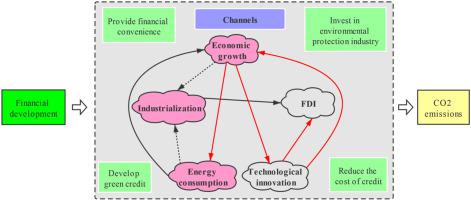Energy Policy ( IF 9 ) Pub Date : 2021-04-07 , DOI: 10.1016/j.enpol.2021.112277 Xin Xu , Shupei Huang , Haizhong An

|
Understanding the influence channels of financial development on CO2 emissions and their causal relationships are necessary for policy makers to reduce CO2 emissions using financial means. These points have not been systematically discussed in previous studies. This paper dynamically identifies five main channels of influence—economic growth, industrialization, foreign direct investment (FDI), technological innovation, and energy consumption—and examines their causal relationships. By adopting a functional-coefficient approach and the Granger causality test based on panel data for 42 countries during 1990–2018, we find that financial development clearly affects CO2 emissions through three channels: industrialization, economic growth, and energy consumption. However, the other channels have only weak influences, and we further confirm the causal relationships among these five channels. Specifically, we confirm three relationships. (1) The impact of financial development on CO2 emissions changes from negative to positive as industrialization and energy consumption increase. (2) Financial development has a positive impact on CO2 emissions when per-capita income is between $1100 and $8100 but a negative impact when per-capita income is less than $1100 or greater than $8100. (3) The economic growth channel is the Granger cause of the energy consumption and technological progress channels, and vice versa. Finally, we discuss the policy implications for reducing CO2 emissions from the perspective of these channels of influence of financial development.
中文翻译:

金融发展对CO 2排放影响渠道的识别和因果分析
了解金融发展对CO 2排放的影响渠道及其因果关系,对于决策者使用金融手段减少CO 2排放是必要的。在以前的研究中尚未对这些观点进行系统地讨论。本文动态地确定了五个主要的影响渠道-经济增长,工业化,外国直接投资(FDI),技术创新和能源消耗-并检验了它们之间的因果关系。通过采用功能系数方法和基于1990-2018年42个国家/地区面板数据的格兰杰因果关系检验,我们发现金融发展明显影响了CO 2通过三个渠道进行排放:工业化,经济增长和能源消耗。但是,其他渠道的影响很小,我们进一步确认了这五个渠道之间的因果关系。具体而言,我们确认了三种关系。(1)随着工业化和能源消耗的增加,金融发展对CO 2排放的影响从负向正变化。(2)金融发展对CO 2有积极影响人均收入在1100美元至8100美元之间时的排放,但当人均收入低于1100美元或高于8100美元时,则产生负面影响。(3)经济增长通道是能源消耗和技术进步通道的格兰杰原因,反之亦然。最后,我们从这些金融发展影响渠道的角度讨论减少CO 2排放的政策含义。


























 京公网安备 11010802027423号
京公网安备 11010802027423号